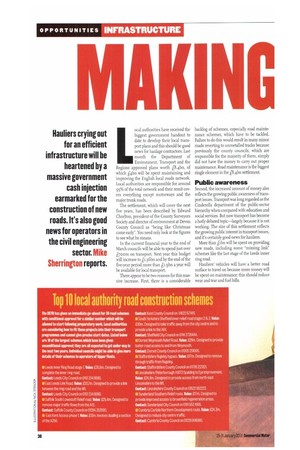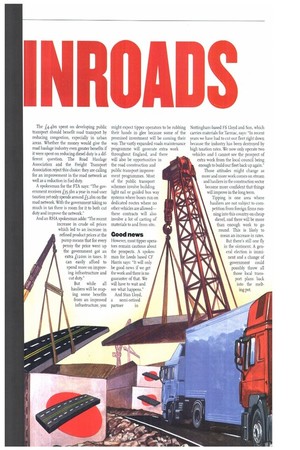MAK N G Hauliers crying out for an efficient infrastructure will
Page 40

Page 41

If you've noticed an error in this article please click here to report it so we can fix it.
be heartened by a massive government cash injection earmarked for the construction of new roads. It's also good news for operators in the civil engineering sector. Mike Sherrington reports. Local authorities have received the biggest government handout to date to develop their local transport plans and this should be good news for haulage contractors. Last month the Department of Environment, Transport and the Regions approved plans worth L8.4bn, of which f4bn will be spent maintaining and improving the English local roads network. Local authorities are responsible for around 95% of the total network and their remit covers everything except motorways and the major trunk roads.
The settlement, which will cover the next five years, has been described by Edward Chorlton, president of the County Surveyors Society and director of environment at Devon County Council as "being like Christmas come early". You need only look at the figures to see what he means.
In the current financial year to the end of March councils will be able to spend just over .t7oom on transport. Next year this budget will increase to fr.3Gbn and by the end of the five-year period more than fr.9bn a year will be available for local transport.
There appear to be two reasons for this massive increase. First, there is a considerable backlog of schemes, especially road maintenance schemes, which have to be tackled_ Failure to do this would result in many minor roads reverting to unmetalled tracks because previously the county councils, which are responsible for the majority of them, simply did not have the money to carry out proper maintenance. Road maintenance is the biggest single element in the f8.4bn settlement.
Public awareness
Second, the increased amount of money also reflects the growing public awareness of transport issues. Transport was long regarded as the Cinderella department of the public-sector hierarchy when compared with education and social services. But now transport has become a hotly debated topic—largely because it is not working. The size of this settlement reflects the growing public interest in transport issues, and it's certainly good news for hauliers.
More than Libn will be spent on providing new roads, including some "missing link" schemes like the last stage of the Leeds inner ring road.
Hauliers' vehicles will have a better road surface to travel on because more money will be spent on maintenance; this should reduce wear and tear and fuel bills. The L4.4bn spent on developing public transport should benefit road transport by reducing congestion, especially in urban areas. Whether the money would give the road haulage industry even greater benefits if it were spent on reducing diesel duty is a different question. The Road Haulage Association and the Freight Transport Association reject this choice: they are calling for an improvement in the road network as well as a reduction in fuel duty.
A spokesman for the FTA says: "The government receives L35.3bn a year in road user taxation yet only spends around L5.2bn on the road network. With the government taking so much in tax there is room for it to both cut duty and improve the network."
And an RHA spokesman adds: "The recent increase in crude oil prices which led to an increase in refined product prices at the pump means that for every penny the price went up the government got an extra LI2OM in taxes. It can easily afford to spend more on improving infrastructure and cut duty."
But while all hauliers will be reaping some benefits from an improved infrastructure, you might expect tipper operators to be rubbing their hands in glee because some of the promised investment will be coming their way. The vastly expanded roads maintenance programme will generate extra work throughout England, and there will also be opportunities in the road construction and public transport improvement programmes. Most of the public transport schemes involve building light rail or guided bus way systems where buses run on dedicated routes where no other vehicles are allowed these contracts will also involve a lot of carting of materials to and from site.
Good news
However, most tipper operators remain cautious about the prospects. A spokesman for Leeds based CF Harris says: "It will only be good news if we get the work and there is no guarantee of that. We will have to wait and see what happens."
And Stan Lloyd, a semi-retired partner in Nottingham-based FS Lloyd and Son, which carries materials for Tarmac, says: "In recent years we have had to cut our fleet right down because the industry has been destroyed by high taxation rates. We now only operate two vehicles and I cannot see the prospect of extra work from the local council being enough to build our fleet back up again."
Those attitudes might change as more and more work comes on stream and hauliers in the construction sector become more confident that things will improve in the long term.
Tipping is one area where hauliers are not subject to competition from foreign firms running into this country on cheap diesel, and there will be more than enough work to go round. This is likely to mean an increase in rates. But there's still one fly in the ointment. A general election is imminent and a change of government could possibly throw all those local transport plans back into the melting pot.




































































































































































































